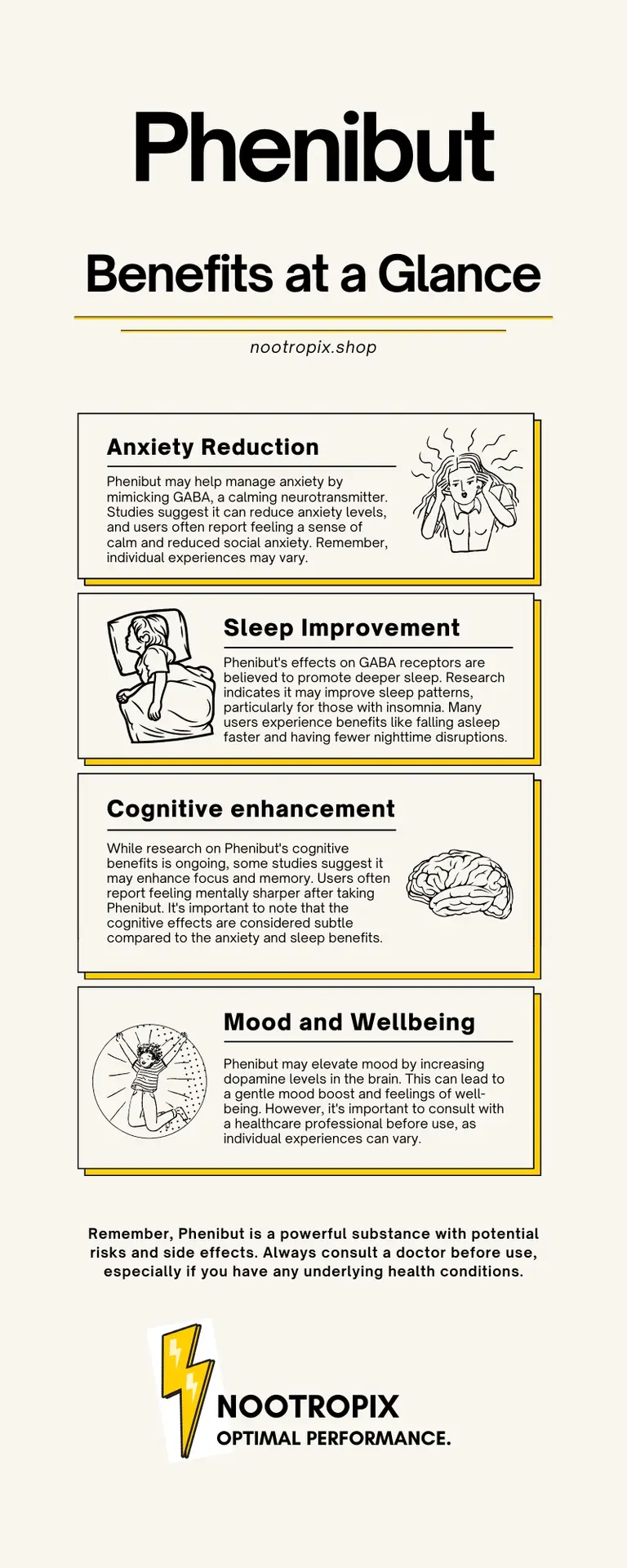Understanding Phenibut: From Origins to Neurological Action and Legal Status
- Nootropix

This comprehensive resource dives into Phenibut, a popular nootropic known for its potential to reduce anxiety and improve sleep. We examine its benefits, risks, and global legal status, offering a balanced and insightful perspective.
What is Phenibut? Benefits, Side Effects, and More
Phenibut, chemically known as β-Phenyl-γ-aminobutyric acid, is a central nervous system depressant with anxiolytic and nootropic effects. Developed in the Soviet Union in the 1960s, it was introduced for clinical use by the 1970s. Phenibut mimics the action of the inhibitory neurotransmitter GABA, but with the added phenyl ring, it can cross the blood-brain barrier more effectively than GABA administered externally. This allows Phenibut to directly influence brain chemistry.
Historical Context
The inception of Phenibut traces back to Soviet Russia, where it was synthesized by Professor Vsevolod Perekalin’s team and tested at the A.I. Herzen Leningrad Pedagogical Institute. Its initial purpose was to aid astronauts in coping with stress, improve cognitive functions, and ensure quality sleep without the after-effects common with traditional tranquilizers. Over the years, its use expanded across various Soviet bloc countries in treating a range of conditions, including anxiety, insomnia, depression, and post-traumatic stress disorder (PTSD).
Mechanism of Action in the Brain
Phenibut’s mechanism is primarily linked to its ability to bind to GABA-B receptors in the brain, similar to Baclofen, another GABA-B agonist. By stimulating these receptors, Phenibut exerts a calming effect on the nervous system, which can alleviate anxiety and induce sleep. Interestingly, at higher dosages, Phenibut may also interact with GABA-A receptors, contributing to its sedative effects. Moreover, Phenibut has been shown to increase dopamine levels within the brain, adding an uplifting mood enhancement to its profile.
Potential Benefits of Phenibut

Phenibut, a nootropic known for its unique properties, has gained attention for its potential benefits, including anxiety reduction, improvement in sleep quality, and cognitive enhancement. This exploration delves into each benefit, supported by scientific evidence, user testimonials, and expert opinions, to provide a comprehensive overview of what Phenibut has to offer.
Anxiety Reduction
Scientific Evidence: Phenibut’s anxiolytic effects are primarily attributed to its ability to mimic GABA, an inhibitory neurotransmitter, reducing nervous system excitability. Research indicates that Phenibut can significantly decrease anxiety levels in patients with various neurological conditions (Kalueff and Nutt, 2007).
User Testimonials: Many users report a profound sense of calm and anxiolysis after taking Phenibut, describing it as a veil of stress being lifted, allowing for clearer thought processes and easier social interactions.
Expert Opinions: Health professionals caution that while Phenibut can be effective for anxiety reduction, its use should be monitored due to the potential for dependence and withdrawal symptoms.
Improvement in Sleep Quality
Scientific Evidence: Studies suggest that Phenibut has a positive effect on sleep patterns, particularly in individuals experiencing insomnia or sleep disturbances related to anxiety (Lapin, 2001). Its sedative effects are believed to stem from its action on GABA-B receptors, facilitating deeper and more restorative sleep.
User Testimonials: Users often describe an improvement in sleep quality, noting easier sleep onset, fewer nighttime awakenings, and a feeling of being well-rested upon waking.
Expert Opinions: Sleep experts acknowledge Phenibut’s potential to enhance sleep but emphasize the importance of using it responsibly, given its sedative effects.
Potential Risks and Side Effects
It’s crucial to acknowledge that while Phenibut offers potential benefits, it also carries risks and can cause side effects. Understanding these is essential for responsible use.
Common Side Effects:
- Drowsiness, sedation, and fatigue
- Dizziness and lightheadedness
- Nausea and digestive discomfort
- Headaches
- Reduced coordination and impaired judgment
Dependence and Withdrawal
Prolonged or high-dose use of Phenibut can lead to physical dependence and tolerance. Abruptly stopping Phenibut after regular use can result in withdrawal symptoms, including:
- Anxiety and rebound anxiety
- Insomnia and sleep disturbances
- Irritability and restlessness
- Tremors
- In severe cases, seizures or delirium
Overdose
Taking excessive amounts of Phenibut can lead to overdose, with symptoms like:
- Extreme sedation and unresponsiveness
- Respiratory depression (slowed or difficult breathing)
- Loss of consciousness
- Coma
- Overdose can be life-threatening. Seek immediate medical attention if an overdose is suspected.
Interactions
Phenibut can interact negatively with other substances, including:
- Alcohol: Combining Phenibut with alcohol greatly increases the risk of sedation, respiratory depression, and overdose.
- Other CNS depressants (e.g., benzodiazepines, opioids): Combining these substances with Phenibut amplifies their sedative and depressant effects.
- Certain medications: Consult a doctor before using Phenibut if you are taking any medications.
Responsible Use Warnings
To minimize risks and maximize potential benefits, adhere to these guidelines:
- Start with low doses: Begin with the lowest effective dose and gradually increase as needed, under the guidance of a healthcare professional if possible.
- Avoid frequent use: Limit Phenibut use to occasional or short-term situations to reduce the risk of tolerance and dependence.
- Do not exceed recommended dosages: Adhere to recommended dosage guidelines and never exceed them in an attempt to experience stronger effects.
- Monitor for side effects: Be aware of potential side effects and discontinue use if experiencing severe or persistent adverse reactions.
- Never combine with alcohol or other CNS depressants: The combination can be dangerous and even fatal.
- Use with caution if you have underlying health conditions: If you have a history of depression, liver or kidney problems, or any other health condition, consult a doctor before using Phenibut.
- Not for use by pregnant or breastfeeding women: There is insufficient information on Phenibut’s safety during pregnancy and breastfeeding.
Disclaimer: This information is not a substitute for professional medical advice. Always consult a healthcare provider before using Phenibut, especially if you have any medical conditions or are taking medications.
Legal Status Around the World
The legal status of Phenibut varies significantly by country, reflecting a range of attitudes towards nootropics and prescription medications:
- United States: Currently, Phenibut is not regulated by the FDA and is available as a dietary supplement. However, its safety and efficacy are not endorsed by the agency for any medical condition.
- Australia: In 2018, Australia classified Phenibut as a Schedule 9 substance, effectively making it illegal to possess without a prescription due to concerns over misuse and withdrawal.
- Russia and Ukraine: In countries of its origin, Phenibut remains a prescription medication, used to treat a wide array of conditions from insomnia and anxiety to alcohol withdrawal syndrome.
- European Union: The legal status of Phenibut in the EU varies by member state, with some countries treating it as a prescription drug and others not having specific regulations.
The differing legal frameworks highlight the global debate on Phenibut’s risk-to-benefit ratio and the challenges in regulating substances that straddle the line between therapeutic drugs and supplements.
A Personal Experience
While everyone’s experience with Phenibut is unique, it’s important to note that some users report finding it helpful in managing previously unmanageable anxiety and improving sleep quality. One individual with prior experience using prescription anxiolytics, found a responsible and occasional Phenibut regimen offered similar benefits with reduced feelings of over-sedation often associated with traditional medications. It’s essential to remember that personal experiences should never replace professional medical advice.
Deeper Dive: Advanced Phenibut Topics
Experienced Phenibut users often seek information on its more nuanced effects and responsible usage strategies. Here’s a deeper look:
Beyond GABA
Research suggests Phenibut might also boost dopamine, offering a subtle mood lift, and interact with GABA-A receptors and potentially affect calcium channels involved in brain signaling. Further studies are needed to clarify these actions.
Cycling and Tapering (IMPORTANT!)
Discuss these strategies with your doctor. Some users report benefits from limiting Phenibut to a few non-consecutive days a week. If discontinuing after regular use, a gradual dosage reduction (tapering) under medical guidance often minimizes withdrawal risks.
Phenibut FAQ: Your Questions Answered
What is a typical dose for Phenibut?
Start with low doses (250-500mg) and gradually increase only if needed. Avoid exceeding recommended dosages found on reputable resources. Consult your doctor for personalized advice.
Can I take Phenibut with other nootropics?
Use caution when combining supplements. Phenibut may interact with other CNS depressants. Always do your research or seek guidance from a healthcare professional.
Are there any long-term risks associated with Phenibut use?
Yes, prolonged use can lead to tolerance, dependence, and withdrawal symptoms. It’s essential to use Phenibut responsibly and avoid frequent or excessive use.
How long do the effects of Phenibut last?
Phenibut’s effects typically begin within 1-2 hours of taking it and can last for several hours, sometimes even up to a day.
Is Phenibut addictive?
Yes, Phenibut carries a risk of addiction, especially with frequent or high-dose use. It’s crucial to use it responsibly to minimize this risk.
How does Phenibut compare to benzodiazepines?
Both Phenibut and benzodiazepines work on GABA receptors, but Phenibut has a longer duration of action and may be less likely to cause drowsiness. However, both carry addiction risks.
How often should I take Phenibut?
Limit Phenibut use to occasional or short-term situations. Avoid daily use to reduce the risk of tolerance and dependence.
Is it safe to take Phenibut before driving or operating machinery?
No, Phenibut can cause drowsiness and impaired judgment. Do not drive or operate machinery after taking it.
What are the signs of Phenibut withdrawal?
Withdrawal symptoms can include anxiety, insomnia, irritability, restlessness, tremors, and in severe cases, seizures or delirium. Seek medical attention if you experience these.
Can I drink alcohol while taking Phenibut?
Absolutely not! Combining Phenibut with alcohol significantly increases the risk of dangerous side effects, including overdose.
Can I take Phenibut with other medications?
Consult with your doctor before taking Phenibut if you are on any medications due to potential interactions.
Is Phenibut safe for everyone?
No, Phenibut may not be safe for individuals with certain health conditions, pregnant or breastfeeding women, or those under 18. Always consult a doctor before use.
Related Nootropics
If you’re interested in alternatives to Phenibut or exploring complementary nootropics, consider these options:
- L-Theanine: A calming amino acid found in tea, promoting relaxation without drowsiness.
- GABA: The primary inhibitory neurotransmitter Phenibut mimics. External GABA supplements have limited bioavailability, but may still be beneficial for some.
- Ashwagandha: An adaptogenic herb that may help manage stress and improve sleep quality.
Explore our selection of these and other nootropics on our shop page.
Resources and Further Reading
National Institutes of Health – PubChem Phenibut Entry: [https://pubchem.ncbi.nlm.nih.gov/compound/4-Amino-3-phenylbutyric-acid-hydrochloride]
Conclusion
Phenibut represents a fascinating case study in the world of psychoactive substances, offering insights into the complexities of brain chemistry, the historical evolution of drug use, and the legal intricacies of global health policy. While its benefits in managing anxiety and improving cognitive functions are clear, the potential for misuse and withdrawal underscores the need for cautious and informed use.
As we delve deeper into the world of nootropics and mental health supplements, understanding compounds like Phenibut is crucial for anyone looking to navigate these options safely and effectively. For more comprehensive guides, insights, and discussions on nootropics, visit Nootropix, your trusted source for cognitive enhancement and mental well-being.
Disclaimer: The information in this article is not intended to replace professional medical advice. Consult a healthcare provider before starting Phenibut, especially if you have any health conditions or are taking medications.
